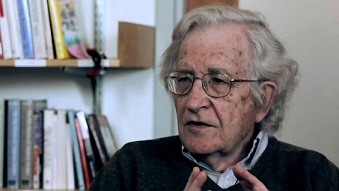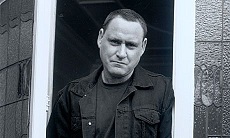On Israeli Defeat And The Future of Jewish Politics
Alimuddin Usmani interviews Gilad Atzmon
Alimuddin Usmani: After "Cast Lead" in 2009 and "Pillar of Defense" in 2012, the Israeli army has launched operation "Protective Edge" in July, 2014 against Gaza. What is the purpose of these repeated large scale military operations?
Gilad Atzmon: It is important to note that Israel hasn't won a single military battle since 1973. True, it has killed many Arabs, but it hasn't managed to achieve any of its military objectives.
Israel’s military domination has been sustained by the power of deterrence. The strategy was to force Arabs to avoid conflict by threatening that they could lose everything. This week has shown that this trick won't work anymore. Palestinian resistance has sprung back to life.
Israel can not solve its problems by military means. The situation is desperate for the Israelis. They have started to realize that they are stuck within a political, ideological and cultural stalemate. Israel is unable to conjure an image of a resolution. There is no prospect of future for the Jewish State.
Furthermore, the Jewish left's blatant lie that the ‘occupation is the problem’ has been exposed this week as we witness Israeli Arab citizens chased by Jewish mobs. As we know, the right-wing call for mass expulsion of all Arabs from Israeli territory is becoming increasingly popular within Israel. This brutal ‘solution’ is totally consistent with Jewish supremacist culture and ideology. After all, Jews, and I mean both Zionists and anti, like to operate within a Jews only environment. But can Israel rid itself of the Palestinians? This is exactly what the Right wing parties within the coalition promise to do.
Back to your question; since the military cannot provide the answers and the politicians cannot produce an image of a solution, the military is used as a firemen's brigade. It supplies short lived victories. The IDF is buying time, it cannot deliver a victory because military objectives cannot even be articulated. The IDF pounds Gaza with missiles, it kills whatever it suspects might be dangerous (a lot of kids, elders and women). But as time goes by, the military options are shrinking and to a certain extent, are not viable any more.
The German military theorist, Carl von Clausewitz suggested in the 19th century that “war is the continuation of politics by other means.” In the case of Israel what we see instead is the reverse of Clausewitz’ idea: Israeli politics is the continuation of the Jewish need for a conflict.
Alimuddin Usmani: Haaretz’ writer Gideon Levy wrote [article scrubbed] that Israel doesn't want peace and that "Rejectionism is embedded in Israel's most primal beliefs. There, at the deepest level, lies the concept that this land is destined for the Jews alone." What is your opinion on this?
Gilad Atzmon: I am delighted to see that more and more people including my bitterest opponents now agree with me that there is something deeply troubling in Jewish culture and ID politics. Haaretz wrote an editorial a few days ago stating that “Israel must undergo a cultural revolution” (source). My bitterest Palestinian opponent, Ali Abunimah, who just recently denounced me for focusing on Jewish culture, seems to have adopted my philosophy. He now points to the morbid racism inherent in Jewish culture and politics.
And now, after praising myself and my ‘prophetic qualities,’ let me address the question. In Hebrew, the word 'Shalom' doesn’t mean peace, harmony or reconciliation. It means ‘security for the Jews.’ In other words, Israel does not have a proper word for peace or reconciliation. Hence it is not surprising that Israel is not a partner in peace. It can’t even contemplate the concept.
As we are becoming aware of the post political conditions in which we live, philosophy and essentialist thinking are vital analytic tools to make sense of the human landscape around us. And now, please ask yourself who have been the bitterest enemies of essentialist and philosophical thinking within academia and politics? It is, obviously, the Jewish left who strives so hard to prevent us from thinking about Jewishness in categorical terms.
Alimuddin Usmani: In an article posted in the Nation on the 2nd of July, Noam Chomsky advised Palestinians to "avoid illusion and myth, and think carefully about the tactics they choose and the course they follow." - What is the strategy that Chomsky advocates?
Gilad Atzmon: In my recent talks I have been making a distinction between the ‘Intellectual’ and the ‘Commissar.' The Intellectual is an inspiration who encourages others to think independently and authentically. The commissar, on the other hand, provides others with the appropriate answers. Instead of guiding one ‘how to think’, the Commissar would tell you ‘what to think.’ The commissar’s ‘pedagogical’ mode is an adequate description of the Left discourse and the so-called Jewish intelligencia. It is there to prescribe the boundaries of correctness within the context of a phantasmic ritual of imaginary dissent. Noam Chomsky is the current emblem of such an awkward anti-intellectual form of thinking.
In addition to being uniquely tedious, which is in itself a crime against humanity, Chomsky tends to selectively cherry pick the facts that fit his favorite narrative, theory or argument while consciously and consciously eliminating the most relevant facts. That Chomsky has gotten away with such tactics for so long, is nothing short of shameful yet symptomatic to the ‘correct’ discourse he is advocating.
In his famous 1843 paper, "On the Jewish Question," Karl Marx suggested that for the world to be emancipated it must be emancipated from the Jews or Judaism. Adopting a similar line, I believe strongly that for the West and dissent to be liberated, it must be emancipated from the Commissar culture, the tyranny of ‘correctness.' We have to reinstate our ability to ‘say what we think’ instead of ‘thinking before we say.'
I don’t want the Chomskys of this world to tell the Palestinians or anyone else to ‘think carefully.' And I hope that Chomsky himself learns not to think ‘carefully’ but instead adopts ethical thinking over his Talmudic legalist approach. We, the rest of humanity, must learn to bring to nurture the spirit of true resistance, including a willingness to sacrifice. This is exactly what the Jewish Left has managed to suppress and for so long. Instead of creating actual change we have indulged ourselves in a discourse of an imaginary activism subject to the corrosive effects of its funders, Wall Street and people like George Soros and his Open Society Institute.
Alimuddin Usmani: Dominique Vidal, a French journalist wrote an article in 2012 which had a strange title : "Protocols of Gilad Atzmon." Probably a reference to "The Protocols of the Elders of Zion". Most of the article is made up of quotes from your book "The Wandering Who?" Dominique Vidal acknowledges that he refuses to debate your ideas. Is it because he is simply unable to adress them?
Gilad Atzmon: This must be the case. I have yet to meet a single Jewish ‘leftist’ who is brave enough to confront me on stage or face to face. As far as I can remember, Professor Norton Mezvinsky was the only Jewish intellectual who appeared with me on stage. And, at least for me, it was an enlightening experience.
I was surprised to find out that Professor Marc Elis, whom many within the Jewish Left regard as one of the leading Jewish theologians, pretty much dedicated the last chapter of his most recent book to my work concluding that I am a contemporary Jewish Biblical prophet. Of course, I am not a prophet, Jewish or otherwise, I simply speak my mind on Israel and Jewish matters, something that Jewish Diaspora seem to be unfamiliar with. It is that fact alone, the idea that I am dismissal of ‘correctness’ that makes me very dangerous for Jewish Left.
Though Marc Ellis' approach may suggest a change of heart and self reflection within the Jewish progressive miniature and insignificant universe, Dominique Vidal is symptomatic of all that is rotten within the Jewish left; the racial exclusivism, the unwillingness to debate and exchange, zero self-reflection and a total and unique absence of intellectual integrity.
Alimuddin Usmani: Criticism of the Talmud is widespread, especially on the internet. The Anti-Defamation League issued a report in 2003 explaining that critics of the Talmud use erroneous translations or erroneous quotations in order to distort it's meaning. What is your response to the ADL?
Gilad Atzmon: The ADL argument is just a projection of common Jewish tactics- it is Jews and Israelis who mistranslate and quote out of context a la Dominique Vidal in order to divert attention from the problems inherent in Jewish culture, the Jewish State and the Talmud. The ADL article exemplifies this method. Instead of addressing the argument it simply shows that the Talmud also includes some ethical preaching.
However, I must add that I do not see the Talmud as the core problem. My study of Jewish history reveals that it isn’t the rabbinical Jews and the followers of the Talmud who have engaged in genocidal crimes. It was actually the Bolshevik Jews who were ‘Stalin's Willing Executioners’ as Yuri Selzkin describes them in his phenomenal book, 'The Jewish Century.' It was the revolutionary Jews who burned and murdered Christians in the name of the 'world proletariat’ while fighting within the Yiddish speaking ‘International Brigade’ (Spain 1936). It was the Left Zionists who expelled the Palestinians in 1948 in what is now known as the Nakba. I think that we have enough evidence to suggest that from a Jewish perspectives the previous century was a ‘Century of Nakbas.' Those ‘progressive’ Jews didn’t follow the Talmud, on the contrary, they believed themselves to be anti-religious, atheist and ‘working class.' Someone mentioned to me recently that for some reason these Jewish atheist revolutionaries always burn churches, they never burn synagogues. Is this a coincidence?
Alimuddin Usmani: Several years ago I met Juliano Mer-Khamis, the Israeli-Palestinian filmmaker, actor and political activist who was murdered in Jenin in 2011. He gave me the impression of a profoundly humane person. How do you assess his work, in particular, the freedom theatre he established.
Gilad Atzmon: He was a hero. Juliano Mer- Khamis always spoke his mind and he paid the ultimate price for it. I will cherish his memory for the rest of my life.
___________________________________________________________________________________
Gilad Atzmon was born in Israel in 1963 and had his musical training at the Rubin Academy of Music, Jerusalem (Composition and Jazz). As a multi-instrumentalist he plays Soprano, Alto, Tenor and Baritone Saxes, Clarinet and Flutes. His album Exile was the BBC jazz album of the year in 2003. He has been described by John Lewis on the Guardian as the “hardest-gigging man in British jazz". His albums, of which he has recorded nine to date, often explore political themes and the music of the Middle East. Until 1994 he was a producer-arranger for various Israeli Dance & Rock Projects, performing in Europe and the USA playing ethnic music as well as R&R and Jazz. Coming to the UK in 1994, Atzmon recovered an interest in playing the music of the Middle East, North Africa and Eastern Europe that had been in the back of his mind for years. In 2000 he founded the Orient House Ensemble in London and started re-defining his own roots in the light of his emerging political awareness. Since then the Orient House Ensemble has toured all over the world. The Ensemble includes Eddie Hick on Drums, Yaron Stavi on Bass and Frank Harrison on piano & electronics. Also, being a prolific writer, Atzmon's essays are widely published. His novels 'Guide to the perplexed' and 'My One And Only Love' have been translated into 24 languages. The Wandering Who? can be ordered here. Gilad Atzmon's Blog is here.
___________________________________________________________________________________
Source: Gilad's Blog. URL: http://www.a-w-i-p.com/index.php/2014/07/12/on-israeli-defeat-and-the



























